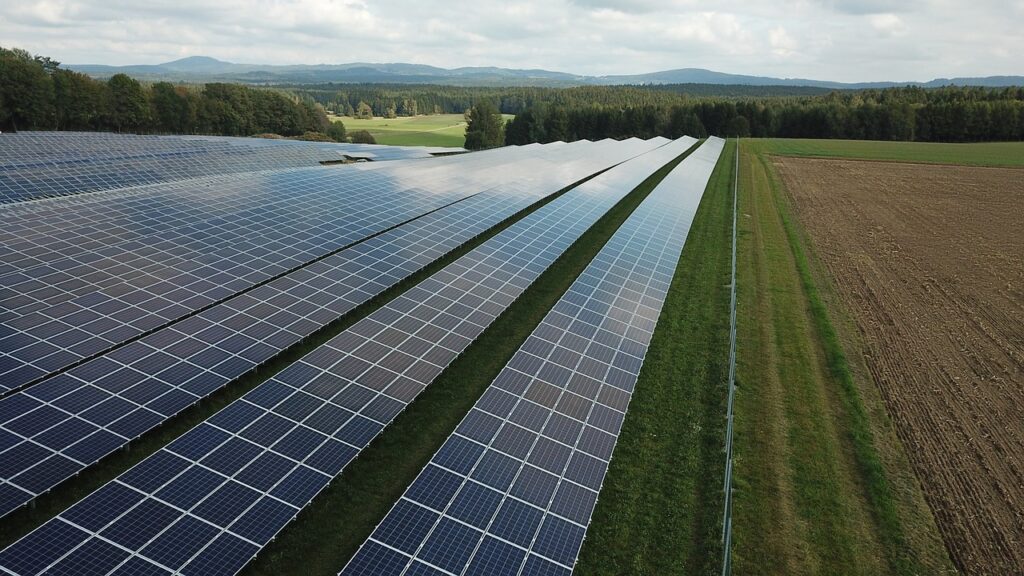Harnessing the Sun: Exploring the Multifaceted Uses of Solar Energy
Solar energy, harnessed from the sun’s rays, has emerged as a cornerstone in our quest for sustainable and renewable energy sources. However it’s not just about producing electricity. The uses of solar energy extend far beyond what one might typically imagine. Additionally, in this comprehensive guide, we’ll delve into the various facets of solar energy, illustrating its versatility and the profound impact it has on our daily lives and the environment.
The Basics of Solar Energy
Understanding Solar Cells and the Photovoltaic Effect
At the heart of solar energy technology are solar cells, which convert sunlight into electrical energy. Indeed this process, known as the photovoltaic effect, is what makes solar panels effective in capturing solar radiation and transforming it into a usable form of electricity.
Solar Radiation: Earth’s Natural Energy Source
Solar radiation, a powerful and natural energy source, is abundant and freely available. By harnessing this energy, we can significantly reduce our reliance on fossil fuels. Thereby minimizing our carbon footprint and combating greenhouse gas emissions.
Applications of Solar Energy in Daily Life
From Heating to Powering Homes: The Versatility of Solar Systems
One of the most common uses of solar energy is in residential settings. Hence solar heating systems and solar water heaters have become increasingly popular in the United States and around the world. These systems utilize solar collectors to absorb the sun’s energy, which is then used for heating water or space within homes.
Solar Power Systems: Transitioning to Renewable Energy
Uses of Solar Energy: Solar power systems, incorporating photovoltaic cells, are vital in transitioning from traditional fossil fuels to renewable energy sources. Therefore they play a significant role in reducing electricity bills and providing a sustainable source of power for entire houses.
Industrial and Commercial Uses of Solar Energy

Solar Farms and Power Stations: Pioneering Large-Scale Solar Electricity
In the realm of large-scale electricity production, solar farms and solar power plants are becoming increasingly significant. In fact these facilities harness solar energy on a massive scale, feeding substantial amounts of electrical energy into the power grid.
Revolutionizing Agriculture with Solar-Powered Systems
Agriculture has also seen the benefits of solar energy, with solar-powered pumps and solar dryers becoming essential tools in farming, especially in remote areas where access to the traditional power grid is limited.
Solar Technology: Beyond Electricity Generation
Solar Batteries and Solar-Powered Devices: Innovations in Energy Storage
Impressively solar technology has evolved to include solar batteries, which store excess energy generated by solar panels for later use. Also this advancement has been pivotal in the use of solar panels even on cloudy days, ensuring a constant energy supply.
Solar Lighting and Solar Cookers: Sustainable Alternatives for Daily Needs
Solar lighting systems and solar cookers are effective ways to utilize solar energy in daily life. Hence these devices reduce the need for conventional power sources, offering a green alternative for lighting homes and cooking meals.
Expanding the Reach: Solar Energy in Various Sectors
Solar Water Heating: A Cost-Effective Solution
Solar water heating systems are a practical application of solar energy, widely used in both residential and commercial settings. Without doubt these systems involve solar collectors and a storage tank, efficiently heating water and reducing energy costs.
Solar Energy in the Healthcare Sector
Besides, in recent years, healthcare facilities have begun to adopt solar energy systems, recognizing their potential in ensuring uninterrupted power supply, crucial for life-saving equipment and maintaining critical medical infrastructure.
Environmental Impact of Solar Energy

Reducing Greenhouse Gas Emissions and Fossil Fuel Dependence
Of course a significant advantage of solar energy is its ability to minimize greenhouse gas emissions. Also by replacing fossil fuels with solar power, we substantially reduce our carbon dioxide output, contributing to a healthier environment.
Solar Farms: Harnessing Energy on a Grand Scale
Solar farms play a critical role in large-scale solar electricity generation. Of course these installations, spread over vast areas, capture solar radiation on a massive scale, feeding green energy into the power grid and reducing the dependence on non-renewable sources like natural gas.
Solar Energy in Remote and Underserved Regions
Bringing Power to Remote Areas
Chiefly one of the most impactful uses of solar energy is its ability to provide electricity in remote areas. Also solar panels and solar-powered systems offer a viable solution for electrifying regions where traditional energy infrastructure is absent or impractical.
Solar Energy for Clean Water Access
Solar-powered pumps and desalination systems are revolutionizing water access in remote communities, using solar energy to pump and purify water, significantly improving living conditions and supporting sustainable development.
Solar Energy in Transportation and Infrastructure

Solar-Powered Cars and Public Transit
The transportation sector is witnessing a gradual shift towards solar energy, with innovations like solar-powered cars and buses gaining traction. This shift not only reduces emissions but also paves the way for a more sustainable future in mobility.
Solar Lighting in Public Spaces
Did you know that solar lighting is becoming increasingly popular for street lights and public spaces, offering a cost-effective, environmentally friendly alternative to traditional lighting, and reducing the burden on utility companies.
Solar Energy in Education and Public Awareness
Educational Initiatives and Awareness Programs
Educational institutions and public awareness campaigns play an important role in promoting the use of solar energy. However by educating communities about the benefits and potential of solar power, these initiatives are fostering a more sustainable future.
Innovative Uses of Solar Energy
Solar Cooking: A Sustainable Alternative
Firstly solar cookers and solar ovens are innovative ways to use solar energy for cooking. Of course these devices harness direct sunlight, converting it into heat to cook food, offering a sustainable alternative to conventional cooking methods.
Solar Energy in Art and Architecture
Artists and architects are increasingly incorporating solar technologies into their work, using solar panels and photovoltaic materials creatively to make statements about sustainability and renewable energy.
This section has expanded on the environmental impacts of solar energy, its applications in various sectors including healthcare, remote regions, transportation, and public infrastructure, as well as innovative uses in cooking, art, and architecture. So the next segments will delve deeper into the technical aspects and future prospects of solar energy.
Technical Aspects of Solar Energy Utilization

Photovoltaic Cells: Converting Sunlight into Electricity
Indeed photovoltaic cells, the building blocks of solar panels, play a crucial role in converting sunlight into electric current. These semiconductor materials, when exposed to sunlight, generate a flow of electricity, showcasing the photovoltaic effect in action.
Solar Collectors: Capturing and Utilizing Thermal Energy
Solar collectors are essential in systems that harness solar thermal energy. Furthermore these devices collect and concentrate solar radiation, transforming it into thermal energy for heating water or air for space heating.
Maximizing Efficiency: The Role of Surface Area and Placement
The efficiency of a solar energy system greatly depends on the surface area of the solar panels and their placement. Properly angled panels with a large surface area can capture more sunlight, thus generating more energy.
Storage Solutions: Solar Batteries and Molten Salts
Storage is a vital component of solar energy systems. Solar batteries store excess electricity for later use, while innovative solutions like molten salts in solar power plants store heat, which can be converted into electricity when needed.
Future Prospects and Developments in Solar Energy
Advancements in Solar PV Systems and Technologies
Continuous research and development in solar PV systems are leading to more efficient and cost-effective solutions. But innovations in photovoltaic panels and materials are making solar energy more accessible and viable for widespread use.
The Potential of Solar Power in Combating Climate Change
Solar energy plays a vital role in the global effort to combat climate change. So by reducing reliance on fossil fuels and cutting down greenhouse gas emissions, solar power is a key player in the transition to a sustainable, low-carbon future.
Solar Energy in Space Exploration
Solar energy is not just confined to the Earth’s surface. In fact it has a significant role in space exploration, powering satellites and spacecraft, and could potentially be harnessed for future space missions and extraterrestrial colonies.
Economic Implications of Solar Energy Adoption
Reducing Energy Costs for Consumers
Of course one of the most direct benefits of solar energy is the reduction in energy costs for consumers. By generating their own electricity, homeowners can significantly lower their utility bills.
The Impact on Utility Companies and the Power Grid
The increasing adoption of solar energy has implications for utility companies and the traditional power grid. So as more consumers generate their own electricity, demand from utility companies decreases, prompting a shift towards more flexible and sustainable grid systems.
Job Creation and Economic Growth
To be sure the solar energy sector has become a significant source of job creation and economic growth. It’s true, from manufacturing to installation and maintenance, the industry provides a wide range of employment opportunities.
Addressing the Challenges and Limitations

Overcoming Intermittency and Reliability Issues
One of the challenges of solar energy is its intermittency – the fact that it is not available at night or on cloudy days. Hence developing efficient storage solutions and hybrid systems integrating other renewable sources like wind power are key to overcoming these challenges.
The Initial Cost and Investment in Solar Systems
While solar energy saves money in the long run, the initial cost of solar panel systems can be a barrier for many. Therefore incentives, subsidies, and technological advancements are crucial in making solar energy more affordable.
To conclude this section has covered the technical aspects of solar energy, its future prospects, and economic implications, and addressed some of the challenges and limitations. Lastly the final part of the article will focus on the environmental benefits, global trends, and practical advice for individuals and businesses interested in adopting solar energy.
Environmental Benefits of Embracing Solar Energy
A Greener Planet: Reduction in Carbon Footprint
Solar energy’s role in reducing the global carbon footprint is undeniable. By replacing carbon-emitting fossil fuels, solar power significantly reduces carbon dioxide and other greenhouse gas emissions, contributing to a healthier planet.
Solar Energy in Preserving Natural Ecosystems
The shift to solar energy also has positive implications for natural ecosystems. Unlike fossil fuels, solar energy doesn’t require extraction processes that can be harmful to the environment, thus preserving natural landscapes and biodiversity.
Solar Energy’s Contribution to Air and Water Quality
By reducing the need for fossil fuels, solar energy indirectly improves air and water quality. It cuts down on pollutants like sulfur dioxide and nitrous oxides, which are common byproducts of burning fossil fuels, leading to cleaner air and water.
Global Trends and Movements in Solar Energy
The Rise of Solar Energy in Developing Countries
In recent years, developing countries have shown significant interest in solar energy, recognizing its potential in providing affordable and sustainable energy solutions to millions without access to electricity.
Government Initiatives and International Cooperation
Governments worldwide are increasingly supporting solar energy through initiatives like subsidies, tax incentives, and research funding. International cooperation, especially in research and technology transfer, is also playing a crucial role in the global expansion of solar energy.
The Growing Popularity of Community Solar Projects
Community solar projects are becoming popular, allowing people who may not have suitable roofs for solar panels to invest in solar energy. These projects are not only fostering community engagement but also making solar energy accessible to a broader population.
Practical Advice for Adopting Solar Energy

Assessing the Feasibility and Planning
For those considering solar energy, it’s essential to assess the feasibility, including the site’s solar potential, roof condition, and local regulations. Proper planning and consultation with solar energy experts can ensure the successful implementation of a solar system.
Understanding Incentives and Financing Options
Potential solar energy users should explore available incentives and financing options. Many regions offer tax credits, rebates, and financing schemes to make solar energy systems more affordable.
The Importance of Choosing the Right Solar Technology
Selecting the right solar technology is crucial. Factors like climate, the intended use of solar energy (like heating water, generating electricity, or both), and energy needs should guide the choice of solar panels, solar collectors, or other solar technologies.
Maintenance and Upkeep of Solar Systems
Maintaining and regularly servicing solar systems is vital to ensure their longevity and efficiency. This includes cleaning solar panels, checking inverters, and ensuring that the system is functioning optimally.
Conclusion: The Bright Future of Solar Energy
Solar energy stands at the forefront of a sustainable future, offering a plethora of benefits from environmental protection to economic growth. As technology advances and global commitment to renewable energy strengthens, the use of solar energy is set to become more prevalent, shaping a cleaner, greener, and more sustainable world. Embracing solar energy is not just an environmental or economic choice, but a step towards a brighter and more responsible future for our planet.
This final segment highlights the environmental benefits, global trends, and practical advice for adopting solar energy. The article “Uses of Solar Energy” aims to inform, guide, and inspire action towards a more sustainable energy future, emphasizing the importance and versatility of solar energy.
Frequently Asked Questions (FAQs) About Uses of Solar Energy
What are the Most Common Uses of Solar Energy?
The most common uses of solar energy include generating electricity through solar panels, heating water with solar water heaters, and providing light with solar-powered street lights and indoor lighting systems.
How Does Solar Energy Reduce the Carbon Footprint?
Solar energy reduces the carbon footprint by replacing fossil fuels, which emit large amounts of carbon dioxide and other greenhouse gases when burned. By harnessing the sun’s energy, we reduce our reliance on these polluting energy sources.
Can Solar Energy Be Used in Cloudy Climates?
Yes, solar energy can be effective even in cloudy climates. Modern solar panels are capable of capturing indirect sunlight. Though the efficiency might be reduced, they still generate a significant amount of energy.
What Is the Lifespan of a Solar Energy System?
The average lifespan of a solar energy system is about 25 to 30 years. However, many systems continue to operate efficiently beyond this period, albeit with a slight decrease in energy production capacity.
How Cost-Effective is Solar Energy?
Initially, solar energy systems require an investment, but they are cost-effective in the long run due to their low operating costs. Most solar systems pay for themselves over time through reduced utility bills and potential earnings from excess energy production.
Is Maintenance of Solar Energy Systems Demanding?
Maintenance of solar energy systems is relatively minimal. It primarily involves regular cleaning of solar panels and occasional checks of inverters and connections to ensure everything is functioning optimally.
Can Solar Panels Work During a Power Outage?
If a solar panel system includes battery storage, it can provide power during a grid outage. However, grid-tied systems without batteries do not operate during outages for safety reasons.

The Role of Solar Energy in Achieving Sustainable Development Goals
Solar energy is pivotal in achieving several United Nations Sustainable Development Goals (SDGs). It contributes to affordable and clean energy (Goal 7), combats climate change (Goal 13), and fosters innovation and infrastructure development (Goal 9). By promoting solar energy, we can make strides towards a more sustainable and equitable world.
The Evolution of Solar Technologies
Uses of Solar Energy: Solar technologies have evolved significantly over the years. The development of more efficient photovoltaic cells, innovative solar batteries, and the integration of solar energy into various applications like solar-powered cars and solar dryers showcases the dynamic nature of this field.
Solar Energy: A Key Player in the Renewable Energy Transition
As the world seeks to transition to renewable energy sources, solar energy is emerging as a key player. Its ability to supply clean, renewable, and increasingly affordable energy positions it as a cornerstone in this global shift.
Uses of Solar Energy Conclusion: Embracing a Solar-Powered Future
In conclusion, the uses of solar energy are diverse and far-reaching, extending from powering homes and businesses to contributing to global environmental and sustainable development goals. As technology advances and the world gravitates towards greener energy solutions, solar energy stands out as a beacon of hope and progress. Its potential to transform our energy landscape is immense, and its adoption is crucial for creating a sustainable and resilient future for generations to come.
Recent Posts
Understanding Energy and Electricity: The Power For Progress
Energy and Electricity Energy and electricity are integral components of modern life, powering everything from homes and businesses to transportation and communication. Without them, the...
The Future of Wind Energy The future of wind energy is set to play a critical role in addressing global energy needs while combating climate change. As renewable energy sources like wind and...



